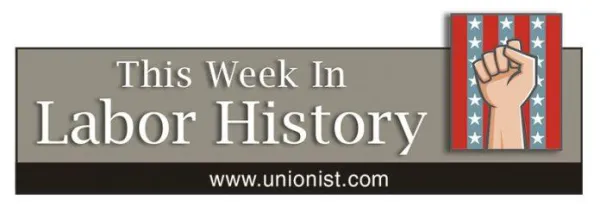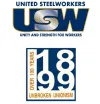This week in labor history: November 21-27

NOVEMBER 21
1927 – Six miners striking for better working conditions under the IWW banner are killed and many wounded in the Columbine Massacre at Lafayette, Colo. Out of this struggle, Colorado coal miners gained lasting union contracts.
1942 – The 1,700-mile Alaska Highway (Alcan Highway) is completed, built during World War II on the order of President Roosevelt. Some 11,000 troops, about one-third of them African-Americans, worked on the project, which claimed the lives of an estimated 30 men. Memorials for the veterans are scattered in spots throughout the highway, including the Black Veterans Memorial Bridge, dedicated in 1993. It wasn’t until 1948 that the military was desegregated.
1945 – The United Auto Workers Union strikes 92 General Motors plants in 50 cities to back up worker demands for a 30 percent raise. An estimated 200,000 workers are out.
1964 – Staten Island and Brooklyn are linked by the new Verrazano Narrows Bridge, the longest suspension bridge in the world at the time and still the longest in the U.S. Joseph Farrell, an apprentice Ironworker on the project, told radio station WNYC: “The way the wind blows over this water it would blow you right off the iron. That was to me and still is the most treacherous part of this business. When the wind grabs you on the open iron, it can be very dangerous.” Three workers died over the course of the five-year project.
1989 – Flight attendants celebrate the signing into law of a smoking ban on all U.S. domestic flights.
NOVEMBER 22
1909 – “The Uprising of the 20,000.” Some 20,000 female garment workers go on strike in New York. Judge tells arrested pickets: “You are on strike against God.” The walkout, believed to be the first major successful strike by female workers in American history, ended the following February with union contracts bringing better pay and working conditions.
1919 – The district president of the American Federation of Labor and two other white men are shot and killed in Bogalusa, La., as they attempt to assist an African-American organizer working to unionize African-American workers at the Great Southern Lumber Co.
1963 – President John F. Kennedy is assassinated. Generally considered a friend of Labor, Kennedy a year earlier had issued Executive Order 10988, which authorized unionization and a limited form of collective bargaining rights for most federal workers (excluding the Department of Defense). Many states followed the example set by Kennedy.
NOVEMBER 23
1170 B.C. – History’s first recorded (on papyrus) strike by Egyptians working on public works projects for King Ramses III in the Valley of the Kings. They were protesting having gone 20 days without pay – portions of grain – and put down their tools. The exact date is estimated, described as within “the sixth month of the 29th year” of Ramses’ reign –1170 B.C. – in The Spirit of Ancient Egypt, by Ana Ruiz. Scholar John Romer adds in Ancient Lives: The Story of the Pharaoh’s Tombmakers that the strike so terrified the authorities they gave in and raised wages. Romer believes it happened a few years later, on Nov. 14, 1152 B.C
1903 – Troops are dispatched to Cripple Creek, Colo., to control protests by striking coal miners.
1935 – Mine Workers President John L. Lewis walks away from the American Federation of Labor to lead the newly formed Committee for Industrial Organization. The CIO and the unions created under its banner organized six million industrial workers over the following decade.
NOVEMBER 24
1875 – Led by Samuel Gompers, who would later found the American Federation of Labor, Cigarmakers’ Int’l Union Local 144 is chartered in New York City.
NOVEMBER 25
1883 – Some 10,000 New Orleans workers, Black and White, participate in a solidarity parade of unions comprising the Central Trades and Labor Assembly. The parade was so successful it was repeated the following two years.
1946 – Teachers strike in St. Paul, Minn., the first organized walkout by teachers in the country. The month-long “strike for better schools” involving some 1,100 teachers – and principals – led to a number of reforms in the way schools were administered and operated.
1947 – Nearly 1,550 typesetters begin what is to become a victorious 22-month strike against Chicago newspapers.
1952 – George Meany becomes president of the American Federation of Labor following the death four days earlier of William Green.
1983 – Canadian postal workers, protesting a Post Office decision to offer discounts to businesses but not individuals, announce that for one week they will unilaterally reduce postage costs by about two-thirds. Declared the Canadian Union of Postal Workers: “(M)embers of the general public, not businesses, can mail letters with 10 cents postage and postal workers will process them without taxing them for insufficient postage.”
NOVEMBER 26
1910 – Six young women burn to death and 19 more die when they leap from the fourth-story windows of a blazing factory in Newark, N.J. The floors and stairs were wooden; the only door through which the women could flee was locked.
NOVEMBER 27
1936 – Some 1,200 workers sit down at Midland Steel, Detroit, forcing recognition of the United Auto Workers.
1937 – The pro-Labor musical revue, “Pins & Needles,” opens on Broadway with a cast of Int’l Ladies Garment Workers Union members. The show ran on Friday and Saturday nights only, because of the cast’s regular jobs. It ran for 1,108 performances before closing.
(Compiled by David Prosten, founder of Union Communication Services)
